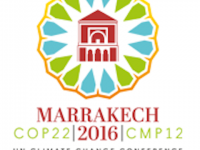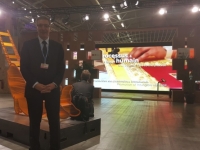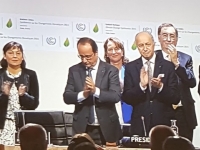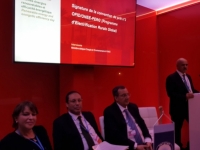Health
Reducing The cost & Fracture of Climate Change in the North & South countries
Review by Taoufiq Boudchiche Diplomat
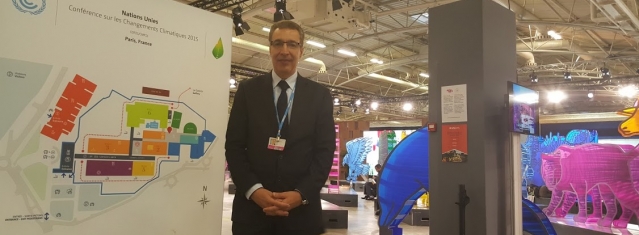
Taoufiq Boudchihe, Moroccan diplomat at COP21 (Source: Rahma Sophia Rachdi)
USPA NEWS -
Despite scientific uncertainties surrounding the possible effects of climate change, international organizations, decision-making circles, civil society and in the scientists are evolving towards new ways of thinking against the "mega risk" of climate." explains Taoufiq Boudchiche, Moroccan diplomat
Despite the scientific uncertainties surrounding the possible effects of climate change on the planet, international organizations, decision-making circles, civil society and in the scientists are evolving towards new ways of thinking against the "mega risk" of climate. Taoufiq Boudchiche is a Moroccan diplomat and economist of development and released this article in a Morroccan journal, that we forward today in its entire integrity.-------------------------------------------------------------
CLIMATE CHANGE HAS ISSUED DEBATES AND DISCREPANCIES BETWEEN NORTH AND SOUTH COUNTRIES
Previously, climate change was part of an environmental traditional thinking. This approach has produced international debates between the right to development and the right to pollute that led to the North-South divide between the northern countries and the responsibility for climate change from one side versus the compensation rights for developing countries.
At the same time, we gradually see that climate change poses global challenges of a new genre that could not be overcome without a new generation of international cooperation leveraging for development and climate fracture reduction between developed and developing countries. Hopes are focused on the efficient implementation of the Paris agreement at COP 22 in implementing, including the balance of the cooperation mechanisms relating to components "Mitigation" (reducing greenhouse gases) and "Adaptation" (structural socio-economic transformation in the medium and long term) and developing a sense of "shared development opportunities" instead of a logic of "burden sharing of costs" (said Mr. Laurent Fabius Former President of COP 21).
THE COSTS OF CLIMATE RISK : THE CASE OF AFRICA----------------------------------------------------------------------------
The African continent has very high vulnerability characteristics to climate change because of the low level of development of most countries on the continent and the increased dependence of production systems on natural resources. This vulnerability results in costs in terms of economic losses estimated for 2030 from 1.5 to 3% of GDP while the African continent is not responsible for global warming (source ADB). Building adaptive capacity is as vital as it it for African states to climate change will be implemented internationally.-------------------------------------------------------------------------------------
International programs have been engaged for more than two decades inciting the establishment of national adaptation strategies for the protection of ecosystems (forests, wetlands, marine resources, etc.) but implementation is often limited to a catalog of sectoral measures largely dependent on international cooperation and international financial support, suffering from the lack of a comprehensive approach. While its funding for adaptation to climate change in Africa are estimated between 10 and 20 billion per year, current climate finance flows to Africa are on a range of 50 to 100 million year only. By 2030, the additional estimated cost of adaptation to climate change in Africa is between $ 52 billion and $ 68 billion annually (Source, ADB). Nevertheless, the international funds worldwide are estimated at only $10 billion. We are far short.
CAN WE EXPECT THE EMERGENCE OF A NEW GLOBAL GOVERNANCE AT COP22 ?------------------------------------
The Paris Agreement embodying a form of diplomatic consensus of 195 countries gathered at the COP 21 in Paris represents a significant milestone in the process of international negotiations on climate change by setting such ambitious targets of limiting global climate between 1.5 ° C and 2 ° C by 2100 and funding targets for countries of the South to the tune of $ 100 billion minimum a year from 2020. ------------------------------------------------------------------------------------------------------------
It is therefore a strong political signal to engage humanity in new development paths sober fossil energy against a current path leading to a rise in temperature globally by more than 3 ° C or more than 4 ° which would be unsustainable in terms of climatic changes (acceleration of drought phenomena, flooding and coastal flooding, forest fires, climate migration, etc.). The news of forest fires in Canada amok and causing the displacement of more than 80 000 people illustrate the magnitude of the climate risks. A natural disaster can undo decades of development.----------------------------------------------------------------------
The Paris Agreement nevertheless pose major challenges of climate governance. For developed countries, should be accelerated now tilting towards a "carbon-free" economy while preserving the achieved standard of living. For developing countries, this would lead to adaptation policies to climate change ensuring both economic and social progress of peoples and economic catching up with developed countries. Globally, therefore, should be to imagine an efficient cooperation on financing, capacity building and technology transfer between rich and poor countries on a permanent and equitable (climate justice)
MOROCCO HOTS OF COP22 IS CONCERNED BY THESE ISSUES PRIMARILY---------------------------------------------
Morocco is concerned by these issues primarily. First, as the host country of the next COP, our country will be at the heart of international negotiations as facilitator for the implementation of existing mechanisms and instruments of global climate governance and to create (transparency mechanisms, International Mechanism Warsaw on loss and damage, green Climate Fund, Fund Global Environment, etc.). Then, as a member of the African Group, Morocco will be the spokesman and advocate for international cooperation to adapt to the specificities of the continent. Finally, our country is extremely vulnerable to climate change, must develop an ambitious national climate governance and copy to anticipate, address and manage the climate threat (water stress increasing, heat periods and frequency of extreme cold, aridity increasingly vast areas of territory, flooding and coastal flooding, emerging diseases, forest fires, coastal vulnerability, where more than 60% of urban infrastructure and socio-economic, etc.).-----------------------------------------------------------------------------------------------
This new climate governance should promptly rethink now developing strategies according to new paradigms:
1- progressive centrality of climate in developing strategies that are expected to decline in terms of global human security (food security, health security, territorial security in urban, rural, etc.);-------------------------------------------------------------------
2- Bringing the economy in the era of the economy "carbon-free" by accelerating the use of non-fossil energy;
3- Develop a culture of "climate risk" based on modern approaches resilience to the climate threat in which strengthening capacities of the population and human development would be a central issue;
4. Integrate the climate in territorial development approaches. climate plans by territory (national, regional, local, etc.) should be generalized;
5- Encourage sober innovative modes of production and consumption of energy and low carbon footprint (circular economy, collaborative economy, sustainable urban mobility, etc.).
6- Developing a climate diplomacy so as to influence international negotiations and take full advantage of the opportunities that will be traded internationally on climate finance, technology transfer, sharing of expertise and knowledge and climate risk management.
Cop22 Marrakech Taoufiq Boudchiche Southern Northern Countries Climate Change Fracture Costs United Nations Unfccc Rahma Sophia Rachdi
Liability for this article lies with the author, who also holds the copyright. Editorial content from USPA may be quoted on other websites as long as the quote comprises no more than 5% of the entire text, is marked as such and the source is named (via hyperlink).

